四级英语完形填空练习题及答案解析
大学英语四级完形填空(附答案解析良心制作)

大学英语四级完形填空第一篇Most people have no idea of the hard work and worry that goes into the Collecting of those fascinating Birds and animals that they pay to see in the zoo. One of the questions that is always asked ofinterested in animals and zoos. According to my parents, the first word I was able to say with any (3) was not the C onventional “mamma” or “daddy”, (4)the word “zoo”, which I would (5) over and over again with a shrill (6) until someone, in groups to (7) me up, would take me to the zoo. When I (8) a little older, we lived in Greece and I had a great (9) of pets, ranging from owls to seahorses, and I spent allpets. (12) on I went for a year to the City Zoo, as a student (13) , to get experience of the large animals, such as lions, Bears, Bison and ostriches, (14) were not easy to keep at home. When I left, I (15) had enough money of my own to Be able to (16) my first trip and I have Been going (17) ever since then. Though a Collector's job is not an easy one and is full of (18), it is Certainly a job which will appeal (19) all those who love animals and (20) .1.A.how B. where C. when D. whether2.A.region B. field C. place D. Case3.A.clarity清晰 B. emotion C. sentiment(情绪) D. affection(情感)4.A.except B. But √ C. except for D. But for5.A.recite B. recognize C. read D. repeat6.A.volume B. noise C. voice √ D. pitch7.A.close B. shut √ C. stop D. Comfort8.A.grew √ B. was growing C. grow D. grown9.A.many B. amount C. number √ D. supply10.A.living B. Cultivating 耕种 C. reclaiming 开垦 D. exploring探察11.A.increase B. include C. add √ D. enrichter √ B. further C. then D. subsequently13.A.attendant 仆人 B. keeper C. member D. aide14.A.who B. they C. of which D. which√15.A.luckily B. gladly C. nearly D. successfully16.A.pay B. provide C. allow D. finance支付17.A.normally B. regularly C. usually D. often18.A.expectations B. sorrows C. excitement D. Disappointments√19.A.for B. with C. to√ D. from20.A.excursion B. travel √ C. journey D. Trip第一篇解析:1.【答案】A 根据下一句及随后的内容,作者讲的是怎样成为动物爱好者的(从小就喜欢动物),应当选择A.how。
大学英语四级完形填空附答案
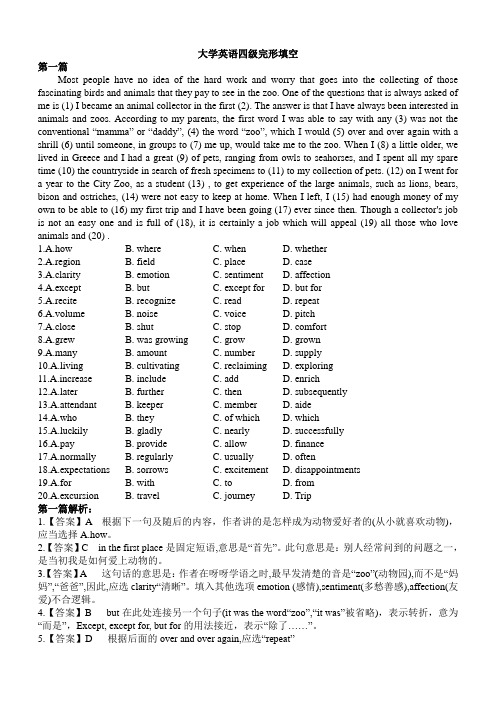
大学英语四级完形填空第一篇Most people have no idea of the hard work and worry that goes into the collecting of those fascinating birds and animals that they pay to see in the zoo. One of the questions that is always asked of me is (1) I became an animal collector in the first (2). The answer is that I have always been interested in animals and zoos. According to my parents, the first word I was able to say with any (3) was not the conventional “mamma” or “daddy”, (4) the word “zoo”, which I would (5) over and over ag ain with a shrill (6) until someone, in groups to (7) me up, would take me to the zoo. When I (8) a little older, we lived in Greece and I had a great (9) of pets, ranging from owls to seahorses, and I spent all my spare time (10) the countryside in search of fresh specimens to (11) to my collection of pets. (12) on I went for a year to the City Zoo, as a student (13) , to get experience of the large animals, such as lions, bears, bison and ostriches, (14) were not easy to keep at home. When I left, I (15) had enough money of my own to be able to (16) my first trip and I have been going (17) ever since then. Though a collector's job is not an easy one and is full of (18), it is certainly a job which will appeal (19) all those who love animals and (20) .1.A.how B. where C. when D. whether2.A.region B. field C. place D. case3.A.clarity B. emotion C. sentiment D. affection4.A.except B. but C. except for D. but for5.A.recite B. recognize C. read D. repeat6.A.volume B. noise C. voice D. pitch7.A.close B. shut C. stop D. comfort8.A.grew B. was growing C. grow D. grown9.A.many B. amount C. number D. supply10.A.living B. cultivating C. reclaiming D. exploring11.A.increase B. include C. add D. enrichter B. further C. then D. subsequently13.A.attendant B. keeper C. member D. aide14.A.who B. they C. of which D. which15.A.luckily B. gladly C. nearly D. successfully16.A.pay B. provide C. allow D. finance17.A.normally B. regularly C. usually D. often18.A.expectations B. sorrows C. excitement D. disappointments19.A.for B. with C. to D. from20.A.excursion B. travel C. journey D. Trip第一篇解析:1.【答案】A 根据下一句及随后的内容,作者讲的是怎样成为动物爱好者的(从小就喜欢动物),应当选择A.how。
(完整版)大学英语四级完形填空30篇(附答案)-打印整理版

大学英语四级完形填空第一篇Most people have no idea of the hard work and worry that goes into the collecting of those fascinating birds and animals that they pay to see in the zoo. One of the questions that is always asked of me is (1) I became an animal collector in the first (2). The answer is that I have always been interested in animals and zoos. According to my parents, the first word I was able to say with any (3) was not the conventional “mamma” or “daddy”, (4) the word “zoo”, which I would (5) over and over ag ain with a shrill (6) until someone, in groups to (7) me up, would take me to the zoo. When I (8) a little older, we lived in Greece and I had a great (9) of pets, ranging from owls to seahorses, and I spent all my spare time (10) the countryside in search of fresh specimens to (11) to my collection of pets. (12) on I went for a year to the City Zoo, as a student (13) , to get experience of the large animals, such as lions, bears, bison and ostriches, (14) were not easy to keep at home. When I left, I (15) had enough money of my own to be able to (16) my first trip and I have been going (17) ever since then. Though a collector's job is not an easy one and is full of (18), it is certainly a job which will appeal (19) all those who love animals and (20) .1.A.how B. where C. when D. whether2.A.region B. field C. place D. case3.A.clarity B. emotion C. sentiment D. affection4.A.except B. but C. except for D. but for5.A.recite B. recognize C. read D. repeat6.A.volume B. noise C. voice D. pitch7.A.close B. shut C. stop D. comfort8.A.grew B. was growing C. grow D. grown9.A.many B. amount C. number D. supply10.A.living B. cultivating C. reclaiming D. exploring11.A.increase B. include C. add D. enrichter B. further C. then D. subsequently13.A.attendant B. keeper C. member D. aide14.A.who B. they C. of which D. which15.A.luckily B. gladly C. nearly D. successfully16.A.pay B. provide C. allow D. finance17.A.normally B. regularly C. usually D. often18.A.expectations B. sorrows C. excitement D. disappointments19.A.for B. with C. to D. from20.A.excursion B. travel C. journey D. Trip第一篇解析:1.【答案】A 根据下一句及随后的内容,作者讲的是怎样成为动物爱好者的(从小就喜欢动物),应当选择A.how。
英语四级完形填空专项训练(真题版附答案和精解)
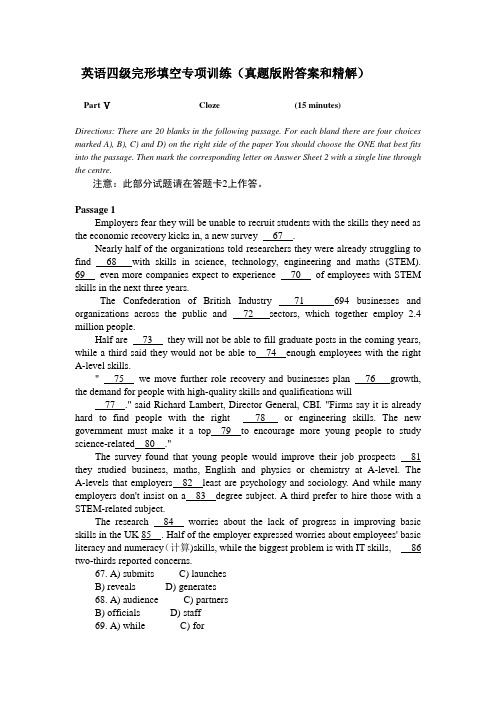
英语四级完形填空专项训练(真题版附答案和精解)Part ⅤCloze (15 minutes)Directions: There are 20 blanks in the following passage. For each bland there are four choices marked A), B), C) and D) on the right side of the paper You should choose the ONE that best fits into the passage. Then mark the corresponding letter on Answer Sheet 2 with a single line through the centre.注意:此部分试题请在答题卡2上作答。
Passage 1Employers fear they will be unable to recruit students with the skills they need as the economic recovery kicks in, a new survey 67 .Nearly half of the organizations told researchers they were already struggling to find 68 with skills in science, technology, engineering and maths (STEM).69 even more companies expect to experience 70 of employees with STEM skills in the next three years.The Confederation of British Industry 71 694 businesses and organizations across the public and 72 sectors, which together employ 2.4 million people.Half are 73 they will not be able to fill graduate posts in the coming years, while a third said they would not be able to 74 enough employees with the right A-level skills." 75 we move further role recovery and businesses plan 76 growth, the demand for people with high-quality skills and qualifications will77 ." said Richard Lambert, Director General, CBI. "Firms say it is already hard to find people with the right 78 or engineering skills. The new government must make it a top 79 to encourage more young people to study science-related 80 ."The survey found that young people would improve their job prospects 81 they studied business, maths, English and physics or chemistry at A-level. The A-levels that employers 82 least are psychology and sociology. And while many employers don't insist on a 83 degree subject. A third prefer to hire those with a STEM-related subject.The research 84 worries about the lack of progress in improving basic skills in the UK 85 . Half of the employer expressed worries about employees' basic literacy and numeracy(计算)skills, while the biggest problem is with IT skills, 86 two-thirds reported concerns.67. A) submits C) launchesB) reveals D) generates68. A) audience C) partnersB) officials D) staff69. A) while C) forB) because D) although70. A) exits C) absencesB) shortages D) departures71. A) surveyed C) exposedB) searched D) exploited72. A) collective C) personalB) private D) civil73. A) confronted C) concernedB) conformed D) confused74. A) bind C) transferB) attain D) recruit75. A) Lest C) BeforeB) Unless D) As76. A) with C) onB) for D) by77. A) dominate C) enforceB) stretch D) intensify78. A) creative C) narrativeB) technical D) physical79. A) priority C) challengeB) option D) judgment80. A) procedures C) thoughtsB) academics D) subjects81. A) until C) whereasB) since D) if82. A) rate C) orderB) discuss D) observe83. A) typical C) positiveB particular D) general84. A) highlighted C) focusedB) prescribed D) touched85. A) masses C) facultyB) workforce D) communities86. A) what C) whereB) whom D) whyPassage 2When it comes to eating smart for your heart, thinking about short-term fixes and simplify life with a straightforward approach that will serve you well for years to come.Smart eating goes beyond analyzing every bite ad you lift __67__ your mouth. "In the past we used to believe that __68__ amounts of individual nutrients (营养物) were the __69__ to good health," Linda Van Horn, chair of the American HeartAssociation's Nutrition Committee. "But now we have a __70__ understanding of healthy eating and the kinds of food necessary to __71__ not only heart disease but disease __72__ general," she adds.Scientists now __73__ on the broader picture of the balance of food eaten __74__ several days or a week __75__ than on the number of milligrams (毫克) of this or that __76__ at each meal.Fruits, vegetables and whole grains, for example, provide nutrients and plant-based compounds __77__ for good health. “The more we learn, the more __78__ we are by the wealth of essential substances they __79__," Van Horn continues, "and how they __80__ with each other to keep us healthy."You'll automatically be __81__ the right heart-healthy track if vegetables, fruits and whole grains make __82__ three quarters of the food on your dinner plate. __83__ in the remaining one quarter with lean meat or chicken, fish or eggs.The foods you choose to eat as well as those you choose to __84__ clearly contribute to your well-being. Without a __85__, each of the small decisions you make in this realm can make a big __86__ on your health in the years to come.67. A) between B) through C) inside D)to68. A) serious B) splendid C) specific D) separate69. A) key B) point C) lead D) center70. A) strict B) different C) typical D) natural71. A) rescue B) prevent C) forbid D) offend72. A) in B) upon C)for D)by73. A) turn B)put C) focus D) carry74. A) over B) along C) with D)beyond75. A) other B) better C) rather D)sooner76. A) conveyed B) consumed C) entered D) exhausted77 A) vital B) initial C) valid D) radical78. A) disturbed B) depressed C) amazed D) amused79. A) retain B) contain C) attain D) maintain80. A) interfere B) interact C) reckon D) rest81. A) at B)of C) on D) within82. A) out B) into C) off D) up83. A) Engage B) Fill C) Insert D) Pack84. A) delete B) hinder C) avoid D) spoil85. A) notion B) hesitation C) reason D) doubt86. A) outcome B) function C) impact D) commitmentPassage 3Over half the world’s people now live in cities. The latest “Global Report on Human Settlements” says a significant change took place last year. The report 67 this week from U.N. Habitat, a United Nations agency.A century ago, 68 than five percent of all people lived in cities. 69 the middle of this century it could be seventy percent, or 70 six and a half billion people.Already three-fourths of people in 71 countries live in cities. Now most urban population 72 is in the developing world.Urbanization can 73 to social and economic progress, but also put 74 on cities to provide housing and 75 . The new report says almost two hundred thousand people move 76 cities and towns each day. It says worsening inequalities, 77 by social divisions and differences in 78 , could result in violence and crime 79 cities plan better.Another issue is urban sprawl (无序扩展的城区). This is where cities 80quickly into rural areas, sometimes 81 a much faster rate than urban population growth.Sprawl is 82 in the United States. Americans move a lot. In a recent study, Art Hall at the University of Kansas found that people are moving away from the 83 cities to smaller ones. He sees a 84 toward “de-urbanization” across the nation.85 urban economies still provide many 86 that rural areas do not.67. [A]came on [C]came over[B]came off [D]came out68. [A]more [C]less [B]other [D]rather69. [A]By [C]Along [B]Through [D]To70. [A]really [C]ever[B]barely [D]almost71. [A]flourishing [C]thriving[B]developed [D]fertile72. [A]extension [C]raise[B]addition [D]growth73. [A]keep [C]lead[B]turn [D]refer74. [A]pressure [C]restraint [B]load [D]weight75. [A]surroundings [C]concerns[B]communities [D]services76. [A]onto [C]around [B]into [D]upon77. [A]pulled [C]drawn[B]driven [D]pressed78. [A]situation [C]treasure[B]wealth [D]category79. [A]when [C]unless [B]if [D]whereas80. [A]expand [C]invade[B]split [D]enlarge81. [A]in [C]with [B]beyond [D]at82. [A]common [C]ordinary[B]conventional [D]frequent83. [A]essential [C]primitive [B]prior [D]major84. [A]trend [C]direction[B]style [D]path85. [A]Then [C]For [B]But [D]While86. [A]abilities C]possibilities[B]qualities [D]realities Passage 4The term e-commerce refers to all commercial transactions conducted over the Internet, including transactions by consumers and business-to-business transactions. Conceptually, e-commerce does not __67__ from well-known commercial offerings such as banking by phone, "mail order" catalogs, or sending a purchase order to supplier __68__ fax.E-commerce follows the same model __69__ in other business transactions; the difference __70__ in the details.To a consumer, the most visible form of e-commerce consists __71__ online ordering. A customer begins with a catalog of possible items, __72__ an item, arranges a form of payment, and __73__ an order. Instead of a physical catalog,e-commerce arranges for catalogs to be __74__ on the Internet. Instead of sending an order on paper or by telephone, e-commerce arranges for orders to be sent __75__ a computer network. Finally, instead of sending a paper representation of payment such as a check, e-commerce __76__ one to send payment information electronically.In the decade __77__ 1993, e-commerce grew from an __78__ novelty (新奇事物) to a mainstream business influence. In 1993, few __79__ had a web page, and__80__ a handful allowed one to order products or services online. Ten years __81__,both large and small businesses had web pages, and most __82__ users with the opportunity to place an order. __83__, many banks added online access, __84__ online banking and bill paying became __85__. More importantly, the value of goods and services __86__ over the Internet grew dramatically after 1997.67.A) distractB) descendC) differD) derive68.A) withB) viaC) fromD) off69.A) appearedB) usedC) resortedD) served70.A) situatesB) liesC) rootsD) locates71.A) onB) ofC) forD) to72.A) reflectsB) detectsC) protectsD) selects73.A) sends inB) puts outC) stands forD) carries away74.A) visibleB) responsibleC) feasibleD) sensible75.A) besideB) overC) beyondD) up76.A) appealsB) admitsC) advocatesD) allows77.A) afterB) behindC) untilD) toward78A) optionalB) invalidC) occasionalD) insignificant79.A) communitiesB) corpsC) corporationsD) compounds80.A) largelyB) slightlyC) solelyD) only81.A) latelyB) laterC) lateD) latter82.A) offeredB) convincedC) equippedD) provided83.A) InsteadB) NeverthelessC) HoweverD) Besides84.A) andB) orC) butD) though85.A) differentB) flexibleC) widespreadD) productive86.A) acquiredB) adaptedC) practicedD) proceededPassage 5Older people must be given more chances to learn if they are to contribute to society rather than be a financial burden, according to a new study on population published recently.The current people approach which 67 on younger people and on skills for employment is not 68 to meet the challenges of demographic (人口结构的) change, it says. Only 1% of the education budget is 69 spent on the oldest third of the population.The 70 include the fact that most people can expect to spend a third of their lives in 71 , that there are now more people over 59 than under 16 and that 11.3 million people are 72 state pension age.“73 needs to continue throughout life. Our historic concentration of policy attention and resources 74 young people cannot meet the new 75 ,”says the report’s author, Professor Stephen McNair.The major 76 of our education budget is spent on people below the age of 25. 77 people are changing their jobs, 78 , partners and lifestyles more often than 79 , they need opportunities to learn at every age 80 , some people are starting new careers in their 50s and later.People need opportunities to make a “midlife review”to 81 to the later stage of employed life, and to plan for the transition (过渡) 82 retirement, which may now happen 83 at any point from 50 to over 90, says McNair.And there should be more money 84 to support people in establishing a 85 of identity and finding constructive 86 for the “third age”, the 20 or more years they will spend in healthy retired life.67. A) operates B) focuses C) counts D) depends68. A) superior B) regular C) essential D) adequate69. A) currently B) barely C) anxiously D) heavily70. A) regulations B) obstacles C) challenges D) guidelines71. A) enjoyment B) retirement C) stability D) inability72. A) over B) after C) across D) beside73. A) Indentifying B) Learning C) Instructing D) Practicing74. A) at B) by C) in D) on75. A) desires B) realms C) needs D) intentions76. A) measure B) ratio C) area D) portion77. A) When B) Until C) Whether D) Before78. A) neighbors B) moods C) homes D) minds79. A) age B) ever C) previously D) formerly80. A) For example B) By contrast C) In particular D) On average81. A) transform B) yield C) adjust D) suit82. A) within B) from C) beyond D) to83. A) unfairly B) unpredictably C) instantly D) indirectly84. A) reliable B) considerable C) available D) feasible85. A) sense B) conscience C) project D) definition86. A) ranks B) assets C) ideals D) rolesPassage 6Kimiyuki Suda should be a perfect customer for Japan’s car-makers. He’s a young, successful executive at an Internet-services company in Tokyo and has plenty of disposable 67 . He used to own Toyota’s Hilux Surf, a sport utility vehicle. But now he uses 68 subways and grains . “It’s not inconvenient at all ,” he says 69 , “having a car is so 20th century.”Suda reflects a worrisome 70 in Japan; the automobile is losing its emotional appeal, 71 among the young ,who prefer to spend their money on the latest electronic devices. 72 mini-cars and luxury foreign brands are still popular ,everything in between is 73 .Last years sales fell 6.7 percent, 7.6 percent 74 you don’t count the mini-car market. There have been 75 one-year drops in other nations :sales in Germany fell 9 percent in 2007 76 a tax increase. But experts say Japan is 77 in that sales have been decreasing steadily 78 time. Since 1990, yearly new-car sales have fallen from 7.8 million to 5.4 million units in 2007.Alarmed by this state of 79 , the Japan Automobile Manufacturers Association (JAMA) 80 a comprehensive study of the market in 2006. It found that a 81 wealth gap, demographic(人口结构的) changes and 82 lack of interest in cars ledJapanese to hold their 83 longer , replace their cars with smaller ones 84 give up car ownership altogether. JAMA 85 a further sales decline of 1.2 percent this year. Some experts believe that if the trend continues for much longer, further consolidation (合并) in the automotive sector is 86 .67. A) profit C) incomeB) payment D) budget68. A) mostly C) occasionallyB) partially D) rarely69. A) Therefore C) OtherwiseB) Besides D) Consequently70. A) drift C) currentB) tide D) trend71. A) remarkably C) speciallyB) essentially D )particularly72. A) While C) WhenB) Because D) Since73. A) surging C) slippingB) stretching D) shaking74. A) unless C) asB) if D) after75. A) lower C) broaderB) slighter D) larger76. A) liable to C) thanks toB) in terms of D) in view of77. A) unique C) mysteriousB) similar D) strange78. A) over C) onB) against D) behind79. A) mess C) growthB) boom D) decay80. A) proceeded C) launchedB)relieved D) revised81. A) quickening C) strengtheningB) widening D) lengthening82. A) average C) abundantB) massive D) general83. A) labels C) vehiclesB) cycles D) devices84. A) or C) butB) until D) then85. A) concludes C) reckonsB) predicts D) prescribes86. A) distant C) temporaryB) likely D) immediatePassage 7Playing organized sports is such a common experience in the United States that many children and teenagers that them for granted. This is especially true 67 children from families and communities that have the resources needed to organize and 68 sports programs and make sure that there is easy 69 to participation opportunities. Children in low-income families and poor communities are 70 likely to take organized youth sports for granted because they often 71 the resources needed to pay for participation 72, equipment, and transportation to practices and games 73 their communities do not have resources to build and 74 sports fields and facilities.Organized youth sports 75 appeared during the early 20th century in the United States and other wealthy nations. They were originally developed 76 some educators and developmental experts 77 that the behavior and character of children were 78 influenced by their social surrounding and everyday experiences. This 79 many people to believe that if you could organize the experiences of children in 80 ways, you could influence the kinds of adults that those children would become.This belief that the social 81 influenced a person’s overall development was very 82 to people interested in progress and reform in the United States 83 the beginning of the 20th century. It caused them to think about 84 they might control the experiences of children to 85 responsible and productive adults. They believed strongly that democracy depended on responsibility and that a 86 capitalist economy depended on the productivity of worker.67. A. among B. within C. on D. towards68. A. spread B. speed C. spur D. sponsor69. A. access B. entrance C. chance D. route70 A. little B. less C. more D. much71. A. shrink B. tighten C. limit D. lack72. A. bill B accounts C. fees D. fare73. A. so B. as C. and D. but74. A. maintain B. sustain C. contain D. entertain75.A. last B. first C. later D. finally76.A. before B. while C. until D. when77.A. realized B. recalled C. expected D. exhibited78.A. specifically B. excessively C. strongly D. exactly79. A. moved B. conducted C. put D. led80. A. precise B. precious C. particular D. peculiar81.A. engagement B. environment C.s tate D. status82.A. encouraging B. disappointing C. upsetting D. surprising83.A. for B. with C. over D. at84.A. what B. how C. whatever D. however85.A. multiply B. manufacture C. produce D. provide86.A. growing B. breeding C. raising D. flyingPassage 8Universities are institutions that teach a wide variety of subjects at advanced levels. They also carry out research work aimed -67- extending man's knowledge of these subjects. The emphasis given to each of these functions -68- from university to university, according to the views of the people in -69- and according to the resources available. The smaller and newer universities do no -70- the staff or equipment to carry out the -71- research projects possible in larger institutions. -72- most experts agree that some research activity is -73- to keep the staff and their students in -74- with the lastest developments in their subjects.Most students attend a university mainly to -75- the knowledge needed for their chosen -76-. Educationists believe that this aim should not be the -77- one. Universities have always aimed to produce men and women -78- judgment and wisdom as well as knowledge. For this reason, they -79- students to meet others with differing -80- and to read widely to -81- their understanding in many fields of study. -82- a secondary school course, a student should be interested enough in a subject to enjoy gaining knowledge for its own -83-. He should be prepared to -84- sacrifices to study his chosen -85- in depth. He should have an ambition to make some -86- contribution to man's knowledge.67.A) at B) by C) to D) in68.A) turns B) ranges C) moves D) varies69.A) prospect B) place C) control D) favor70.A) occupy B) possess C) involve D) spare71.A) maximum B) medium C) virtual D) vast72.A) But B) As C) While D) For73.A) natural B) essential C) functional D) optional74.A) coordination B) accordance C) touch D) grasp75.A) acquire B) accept C) endure D) ensure76.A) procession B) profession C) possession D) preference77.A) typical B) true C) mere D) only78.A) with B) under C) on D) through79.A) prompt B) provoke C) encourage D) anticipate80.A) histories B) expressions C) interests D) curiosities81.A) broaden B) lengthen C) enforce D) specify82.A) Amid B) Over C) After D) Upon83.A) object B) effect C) course D) sake84.A) take B) suffer C) make D) pay85.A) field B) target C) scope D) goal86.A) radical B) meaningful C) truthful D) initialPassage 9One factor that can influence consumers istheir mood state. Mood may be defined 67 a 67.A)as C)by temporary and mild positive or negative feeling B)about D)with that is generalized and not tied 68 any particular 68.A)over C)toB)under D)up circumstance. Moods should be 69 from 69.A)derived C)dividedB)descended D)distinguished emotions which are usually more intense, 70 to 70.A)related C)attached specific circumstances, and often conscious. B)referred D)associated71 one sense, the effect of a consumer’s mood 71.A)On C)InB)Of D)Bycan be thought of in 72 the same way as can 72.A)thus C)evenB)much D)stillour reactions to the 73 of our friends—when our 73.A)signal C)viewfriends are happy and “up”, that tends to influence B)gesture D)behaviorus positively, 74 when they are “down”, that can 74.A)for C)unlessB)but D)provided have a 75 impact on us. Similarly, consumers 75.A)relative C)negativeB)decisive D)sensitive operating under a 76 mood state tend to react to 76.A)given C)fixedB)granted D)driven stimulate(刺激因素)in a direction 77 with that 77.A)resistant C)insistent mood state. Thus, for example, we should expect B)persistent D)consistentto see 78 in a positive mood state evaluate 78.A)consumer C)retailersB)businessmen D)manufacturers products in more of a 79 manner than they 79.A)casual C)seriousB)critical D)favorable would when not in such a state, 80 mood states 80.A)However C)MoreoverB)Otherwise D)Nevertheless appear capable of 81 a consum er’s meomory. 81. A) lifting C) raisingB) enhancing D) cultivatingMoods appear to be 82 influenced by mar- 82. A) readily C) cautiously keting techniques. For example, the rhythm, pitch, B) rarely D) currentlyand 83 of music has been shown to influence 83. A) step C) bandB) speed D) volume Behavior such as the 84 of time spent in 84. A) extent C) scopeB) amount D) range Supermarkets or 85 to purchase products. In 85. A) facilities C) reflections Addition, advertising can influence consumers’ B) capacities D) intensions moods which, in 86 , are capable of influencing 86. A) turn C) detail consumers’ reactions to products. B) total D) depthPassage 10An earthquake hit Kashmir on Oct. 8, 2005. it took some 75,000 lives, __67__ 130,000 and left nearly 3.5 million without food, jobs or homes. __68__ overnight, scores of tent villages bloomed __69__ the region, tended by international aid organizations, military __70__ and aid groups working day and night to shelter the survivors before winter set __71__.Mercifully, the season was mild. But with the __72__ of spring the refugees will be moved again. Camps that __73__ health care, food and shelter for 150,000 survivors have begun to close as they were __74__ intended to be permanent.For most of the refugees, the thought of going back brings __75__ emotions. The past six months have been difficult. Families of __76__ many as 10 people have had to shelter __77__ a single tent and share cookstoves and bathing __78__ with neighbors. “They are looking forward to the clean water of their rivers,” officials say. “They are __79__ of free fresh fruit. They want to get back to their herds and start __80__ again.”But most will be returning to __81__ but heaps of ruins. In many villages, electrical __82__ have not been repaired, nor have roads. Aid workers __83__ that it will take years to rebuild what the earthquake took __84__. And for the thousands of survivors, the __85__ will never be complete.Yet the survivors have to start somewhere. New homes can be built __86__ the stones, bricks and beams of old ones. Spring is coming and it is a good time to start again.67. A) injuredB) ruinedC) destroyedD) damaged68. A) AltogetherB) AlmostC) ScarcelyD) Surely69. A) amongB) aboveC) amidD) across70. A) ranksB) equipmentC) personnelD) installations71. A) outB) inC) onD) forth72. A) fallingB) emergenceC) arrivalD) appearing73. A) strengthenedB) aidedC) transferredD) provided74. A) neverB) onceC) everD) yet75. A) puzzledB) contrastedC) doubledD) mixed76. A) likeB) asC) so77. A) byB) belowC) underD) with78. A) facilitiesB) instrumentsC) implementsD) appliances79. A) seekingB) dreamingC) longingD) searching80. A) producingB) cultivatingC) farmingD) nourishing81. A) anythingB) somethingC) everythingD) nothing82. A) linesB) channelsC) pathsD) currents83. A) asideB) awayC) upD) evaluate84. A) asideB) awayD) out85. A) reservationB) retreatC) replacementD) recovery86. A) fromB) throughC) uponD) onto答案和解析:Passage 1Part V Cloze67.【答案】reveals【解析】第一段提出话题,“据一项最新调查显示,现在的雇主们害怕他们雇不到符合要求的毕业生”,launch意思为“发起一场运动”,submit意为“提交,服从”,generate生成,reveal透露,揭露,显示。
大学英语四级完形填空(附答案解析良心制作)
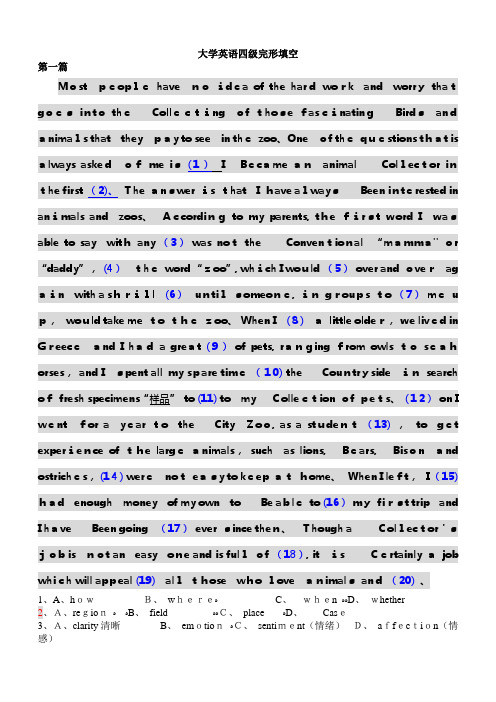
大学英语四级完形填空第一篇Most peoplehave noidea of the hardwork and worrythatgoesintotheCollecting of those fascinatingBirdsandanimals that they pay to see in thezoo、One of thequestions that isanimals and zoos、Accordingto my parents, the first word I wasable to say withany (3)was notthe Conventional “mamma" or “daddy”,(4)theword “zoo”, which I would (5)over and overag ain with a shrill (6)untilsomeone, ingroups to (7)meu p,would take me to thezoo、When I (8) alittle older,we lived in Greeceand I hada great (9)of pets, ranging from owls toseahorses,and I spent all my spare time(10) the Countryside insearchwent for a year to the City Zoo, as a student(13) ,to get experience of the largeanimals,such as lions, Bears, Bison and ostriches,(14) werenoteasy to keep athome、When I left,I (15)had enough money of my own to Be ableto (16)myfirst trip and I have Been going (17)ever since then、Though a Collector'sjob is not an easy one and is fullof(18), it is Certainly ajob which will appeal (19)allthose who love animalsand(20) 、1、A、howB、whereﻩC、when ﻩﻩD、whether2、A、regionﻩﻩB、fieldﻩﻩC、place ﻩD、Case3、A、clarity清晰B、emotionﻩC、sentiment(情绪)D、affection(情感)4、A、except ﻩﻩB、But √C、except for ﻩD、Butfor5、A、recite ﻩﻩB、recognize ﻩC、readﻩﻩﻩD、repeat6、A、volume ﻩB、noise C、voice√ﻩﻩD、pitch7、A、close ﻩﻩB、shut√ﻩﻩC、stop ﻩﻩD、fort8、A、grewﻩ√ﻩB、was growing ﻩC、grow D、grown9、A、manyﻩB、amountﻩC、number √ﻩD、supply10、A、living ﻩﻩB、Cultivating耕种C、reclaiming开垦 D、exploring探察11、A、increaseﻩB、includeC、add √ﻩD、enrich12、A、later ﻩ√B、furtherC、thenﻩﻩD、subsequently13、A、attendant 仆人B、keeperﻩC、member ﻩﻩD、aide14、A、whoB、they ﻩﻩC、ofwhichD、which√15、A、luckily B、gladlyﻩﻩC、nearlyﻩﻩD、successfully16、A、pay ﻩB、provideﻩﻩC、allow D、finance支付17、A、normally ﻩB、regularlyﻩC、usually D、often18、A、expectations B、sorrows ﻩﻩC、excitement D、Disappointment s√19、A、forﻩﻩﻩB、with ﻩﻩﻩC、to√ﻩﻩD、from20、A、excursion ﻩB、travel√C、journey ﻩ D、Trip第一篇解析:1、【答案】A 根据下一句及随后得内容,作者讲得就是怎样成为动物爱好者得(从小就喜欢动物),应当选择A、how。
大学英语四级完形填空30篇(附答案)-打印整理版
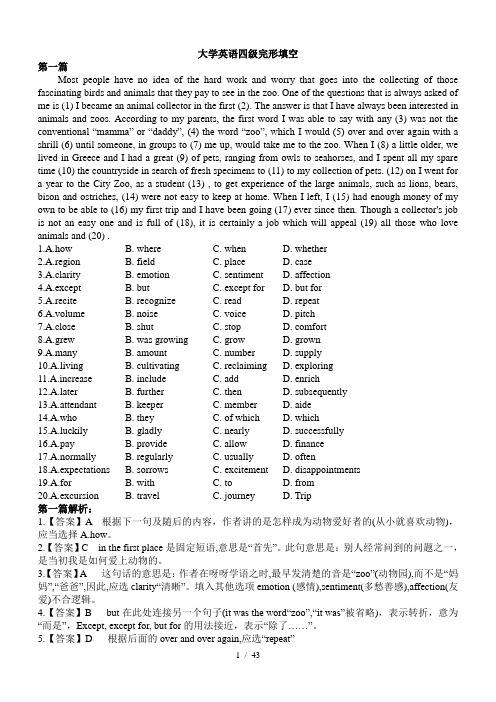
大学英语四级完形填空第一篇Most people have no idea of the hard work and worry that goes into the collecting of those fascinating birds and animals that they pay to see in the zoo. One of the questions that is always asked of me is (1) I became an animal collector in the first (2). The answer is that I have always been interested in animals and zoos. According to my parents, the first word I was able to say with any (3) was not the conventional “mamma” or “daddy”, (4) the word “zoo”, which I would (5) over and over ag ain with a shrill (6) until someone, in groups to (7) me up, would take me to the zoo. When I (8) a little older, we lived in Greece and I had a great (9) of pets, ranging from owls to seahorses, and I spent all my spare time (10) the countryside in search of fresh specimens to (11) to my collection of pets. (12) on I went for a year to the City Zoo, as a student (13) , to get experience of the large animals, such as lions, bears, bison and ostriches, (14) were not easy to keep at home. When I left, I (15) had enough money of my own to be able to (16) my first trip and I have been going (17) ever since then. Though a collector's job is not an easy one and is full of (18), it is certainly a job which will appeal (19) all those who love animals and (20) .1.A.how B. where C. when D. whether2.A.region B. field C. place D. case3.A.clarity B. emotion C. sentiment D. affection4.A.except B. but C. except for D. but for5.A.recite B. recognize C. read D. repeat6.A.volume B. noise C. voice D. pitch7.A.close B. shut C. stop D. comfort8.A.grew B. was growing C. grow D. grown9.A.many B. amount C. number D. supply10.A.living B. cultivating C. reclaiming D. exploring11.A.increase B. include C. add D. enrichter B. further C. then D. subsequently13.A.attendant B. keeper C. member D. aide14.A.who B. they C. of which D. which15.A.luckily B. gladly C. nearly D. successfully16.A.pay B. provide C. allow D. finance17.A.normally B. regularly C. usually D. often18.A.expectations B. sorrows C. excitement D. disappointments19.A.for B. with C. to D. from20.A.excursion B. travel C. journey D. Trip第一篇解析:1.【答案】A 根据下一句及随后的内容,作者讲的是怎样成为动物爱好者的(从小就喜欢动物),应当选择A.how。
大学英语四级完形填空30篇:练习一 (有答案与解析)
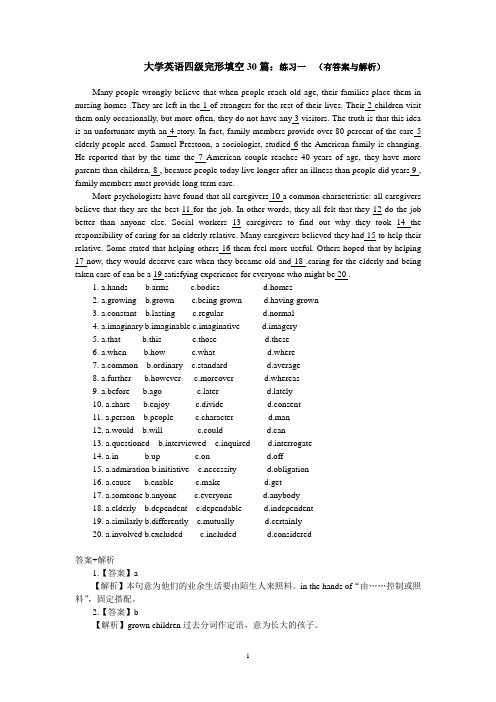
大学英语四级完形填空30篇:练习一(有答案与解析)Many people wrongly believe that when people reach old age, their families place them in nursing homes .They are left in the 1 of strangers for the rest of their lives. Their 2 children visit them only occasionally, but more often, they do not have any 3 visitors. The truth is that this idea is an unfortunate myth-an 4 story. In fact, family members provide over 80 percent of the care 5 elderly people need. Samuel Prestoon, a sociologist, studied 6 the American family is changing. He reported that by the time the 7 American couple reaches 40 years of age, they have more parents than children. 8 , because people today live longer after an illness than people did years 9 , family members must provide long term care.More psychologists have found that all caregivers 10 a common characteristic: all caregivers believe that they are the best 11 for the job. In other words, they all felt that they 12 do the job better than anyone else. Social workers 13 caregivers to find out why they took 14 the responsibility of caring for an elderly relative. Many caregivers believed they had 15 to help their relative. Some stated that helping others 16 them feel more useful. Others hoped that by helping 17 now, they would deserve care when they became old and 18 .caring for the elderly and being taken care of can be a 19 satisfying experience for everyone who might be 20 .1. a.hands b.arms c.bodies d.homes2. a.growing b.grown c.being grown d.having grown3. a.constant sting c.regular d.normal4. a.imaginary b.imaginable c.imaginative d.imagery5. a.that b.this c.those d.these6. a.when b.how c.what d.where7. mon b.ordinary c.standard d.average8. a.further b.however c.moreover d.whereas9. a.before b.ago ter tely10. a.share b.enjoy c.divide d.consent11. a.person b.people c.character d.man12. a.would b.will c.could d.can13. a.questioned b.interviewed c.inquired d.interrogate14. a.in b.up c.on d.off15. a.admiration b.initiative c.necessity d.obligation16. a.cause b.enable c.make d.get17. a.someone b.anyone c.everyone d.anybody18. a.elderly b.dependent c.dependable d.independent19. a.similarly b.differently c.mutually d.certainly20. a.involved b.excluded c.included d.considered答案+解析1.【答案】a【解析】本句意为他们的业余生活要由陌生人来照料。
大学英语四级完形填空30篇_练习一_(有答案与解析)
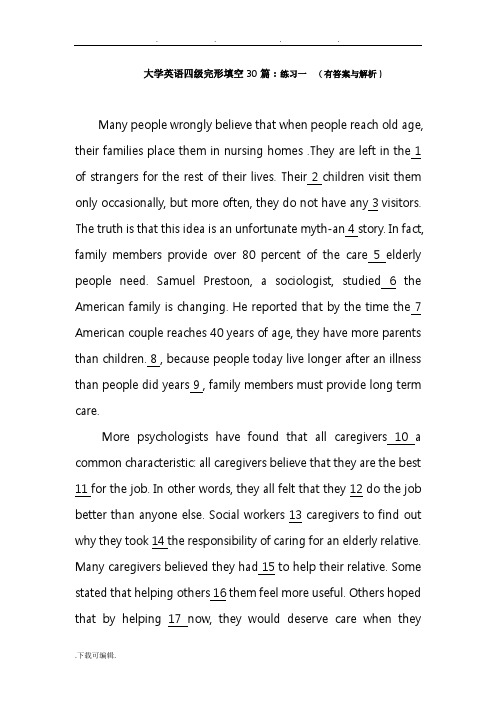
大学英语四级完形填空30篇:练习一(有答案与解析)Many people wrongly believe that when people reach old age, their families place them in nursing homes .They are left in the 1 of strangers for the rest of their lives. Their 2 children visit them only occasionally, but more often, they do not have any 3 visitors. The truth is that this idea is an unfortunate myth-an 4 story. In fact, family members provide over 80 percent of the care 5 elderly people need. Samuel Prestoon, a sociologist, studied 6 the American family is changing. He reported that by the time the 7 American couple reaches 40 years of age, they have more parents than children. 8 , because people today live longer after an illness than people did years 9 , family members must provide long term care.More psychologists have found that all caregivers 10 a common characteristic: all caregivers believe that they are the best 11 for the job. In other words, they all felt that they 12 do the job better than anyone else. Social workers 13 caregivers to find out why they took 14 the responsibility of caring for an elderly relative. Many caregivers believed they had 15 to help their relative. Some stated that helping others 16 them feel more useful. Others hoped that by helping 17 now, they would deserve care when theybecame old and 18 .caring for the elderly and being taken care of can be a 19 satisfying experience for everyone who might be 20 .1. a.hands b.arms c.bodies d.homes2. a.growing b.grown c.being grown d.having grown3. a.constant sting c.regular d.normal4. a.imaginary b.imaginable c.imaginative d.imagery5. a.that b.this c.those d.these6. a.when b.how c.what d.where7. mon b.ordinary c.standard d.average8. a.further b.however c.moreover d.whereas9. a.before b.ago ter tely10. a.share b.enjoy c.divide d.consent11. a.person b.people c.character d.man12. a.would b.will c.could d.can13. a.questioned b.interviewed c.inquired d.interrogate14. a.in b.up c.on d.off15. a.admiration b.initiative c.necessity d.obligation16. a.cause b.enable c.make d.get17. a.someone b.anyone c.everyone d.anybody18. a.elderly b.dependent c.dependabled.independent19. a.similarly b.differently c.mutually d.certainly20. a.involved b.excluded c.included d.considered答案+解析1.【答案】a【解析】本句意为他们的业余生活要由陌生人来照料。
四级完形填空练习题及答案
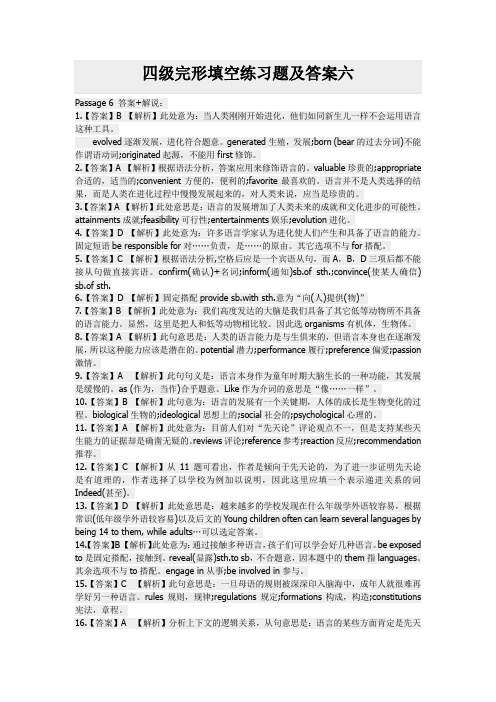
四级完形填空练习题及答案六Passage 6 答案+解说:1.【答案】B 【解析】此处意为:当人类刚刚开始进化,他们如同新生儿一样不会运用语言这种工具。
evolved逐渐发展,进化符合题意。
generated生殖,发展;born (bear的过去分词)不能作谓语动词;originated起源,不能用first修饰。
2.【答案】A 【解析】根据语法分析,答案应用来修饰语言的。
valuable珍贵的;appropriate 合适的,适当的;convenient方便的,便利的;favorite最喜欢的。
语言并不是人类选择的结果,而是人类在进化过程中慢慢发展起来的,对人类来说,应当是珍贵的。
3.【答案】A 【解析】此处意思是:语言的发展增加了人类未来的成就和文化进步的可能性。
attainments成就;feasibility可行性;entertainments娱乐;evolution进化。
4.【答案】D 【解析】此处意为:许多语言学家认为进化使人们产生和具备了语言的能力。
固定短语be responsible for对……负责,是……的原由。
其它选项不与for搭配。
5.【答案】C 【解析】根据语法分析,空格后应是一个宾语从句,而A,B,D三项后都不能接从句做直接宾语。
confirm(确认)+名词;inform(通知)sb.of sth.;convince(使某人确信) sb.of sth.6.【答案】D 【解析】固定搭配provide sb.with sth.意为“向(人)提供(物)”7.【答案】B 【解析】此处意为:我们高度发达的大脑是我们具备了其它低等动物所不具备的语言能力。
显然,这里是把人和低等动物相比较。
因此选organisms有机体,生物体。
8.【答案】A 【解析】此句意思是:人类的语言能力是与生俱来的,但语言本身也在逐渐发展,所以这种能力应该是潜在的。
potential潜力;performance履行;preference偏爱;passion 激情。
大学英语四级完形填空(附答案解析良心制作)

⼤学英语四级完形填空(附答案解析良⼼制作)⼤学英语四级完形填空第⼀篇Most peoplehave noidea of the hardwork and worrythatgoesintotheCollecting of those fascinatingBirdsandanimals that they pay to see in thezoo、One of thequestions that isanimals and zoos、Accordingto my parents, the first word I wasable to say withany (3)was notthe Conven tional “mamma" or “daddy”,(4)theword “zoo”, which I would (5)over and overag ain with a shrill (6)untilsomeone, ingroups to (7)meu p,would take me to thezoo、When I (8) alittle older,we lived in Greeceand I hada great (9)of pets, ranging from owls toseahorses,and I spent all my spare time(10) the Countryside insearchwent for a year to the City Zoo, as a student(13) ,to get experience of the largeanimals,such as lions, Bears, Bison and ostriches,(14) werenoteasy to keep athome、When I left,I (15)had enough money of my own to Be ableto (16)myfirst trip and I have Been going (17)ever since then、Though a Collector'sjob is not an easy one and is fullof(18), it is Certainly ajob which will appeal (19)allthose who love animalsand(20) 、1、A、howB、where?C、when ??D、whether2、A、region??B、field??C、place ?D、Case3、A、clarity清晰B、emotion?C、sentiment(情绪)D、affection(情感)4、A、except ??B、But √C、except for ?D、Butfor5、A、recite ??B、recognize ?C、read???D、repeat6、A、volume ?B、noise C、voice√??D、pitch7、A、close ??B、shut√??C、stop ??D、fort8、A、grew?√?B、was growing ?C、grow D、grown9、A、many?B、amount?C、number √?D、supply10、A、living ??B、Cultivating耕种C、reclaiming开垦 D、exploring探察11、A、increase?B、includeC、add √?D、enrich12、A、later ?√B、furtherC、then??D、subsequently13、A、attendant 仆⼈B、keeper?C、member ??D、aide14、A、whoB、they ??C、ofwhichD、which√15、A、luckily B、gladly??C、nearly??D、successfully16、A、pay ?B、provide??C、allow D、finance⽀付17、A、normally ?B、regularly?C、usually D、often18、A、expectations B、sorrows ??C、excitement D、Disappointment s√19、A、for???B、with ???C、to√??D、from20、A、excursion ?B、travel√C、journey ? D、Trip第⼀篇解析:1、【答案】A 根据下⼀句及随后得内容,作者讲得就是怎样成为动物爱好者得(从⼩就喜欢动物),应当选择A、how。
四级完形填空练习题附答案解析
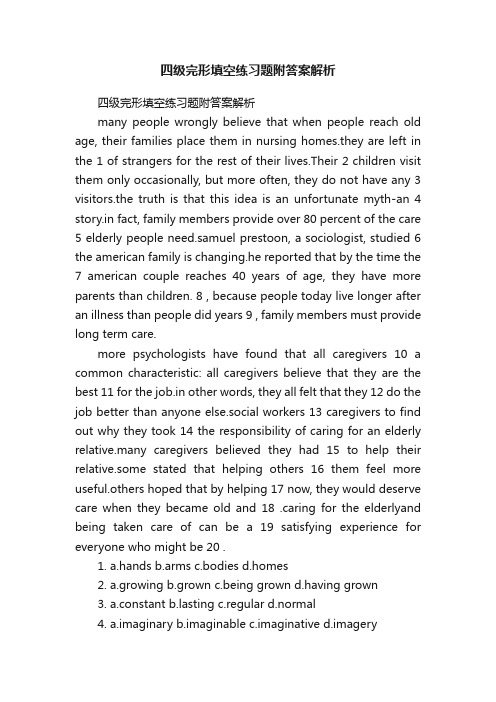
四级完形填空练习题附答案解析四级完形填空练习题附答案解析many people wrongly believe that when people reach old age, their families place them in nursing homes.they are left in the 1 of strangers for the rest of their lives.Their 2 children visit them only occasionally, but more often, they do not have any 3 visitors.the truth is that this idea is an unfortunate myth-an 4 story.in fact, family members provide over 80 percent of the care 5 elderly people need.samuel prestoon, a sociologist, studied 6 the american family is changing.he reported that by the time the 7 american couple reaches 40 years of age, they have more parents than children. 8 , because people today live longer after an illness than people did years 9 , family members must provide long term care.more psychologists have found that all caregivers 10 a common characteristic: all caregivers believe that they are the best 11 for the job.in other words, they all felt that they 12 do the job better than anyone else.social workers 13 caregivers to find out why they took 14 the responsibility of caring for an elderly relative.many caregivers believed they had 15 to help their relative.some stated that helping others 16 them feel more useful.others hoped that by helping 17 now, they would deserve care when they became old and 18 .caring for the elderlyand being taken care of can be a 19 satisfying experience for everyone who might be 20 .1. a.hands b.arms c.bodies d.homes2. a.growing b.grown c.being grown d.having grown3. a.constant sting c.regular d.normal4. a.imaginary b.imaginable c.imaginative d.imagery5. a.that b.this c.those d.these6. a.when b.how c.what d.where7. mon b.ordinary c.standard d.average8. a.further b.however c.moreover d.whereas9. a.before b.ago ter tely10. a.share b.enjoy c.divide d.consent11. a.person b.people c.character d.man12. a.would b.will c.could d.can13. a.questioned b.interviewed c.inquired d.interrogate14. a.in b.up c.on d.off15. a.admiration b.initiative c.necessity d.obligation16. a.cause b.enable c.make d.get17. a.someone b.anyone c.everyone d.anybody18. a.elderly b.dependent c.dependable d.independent19. a.similarly b.differently c.mutually d.certainly20. a.involved b.excluded c.included d.considered答案+解析1.【答案】a【解析】本句意为他们的业余生活要由陌生人来照料。
大学英语四级完形填空30篇(附答案)-打印整理版
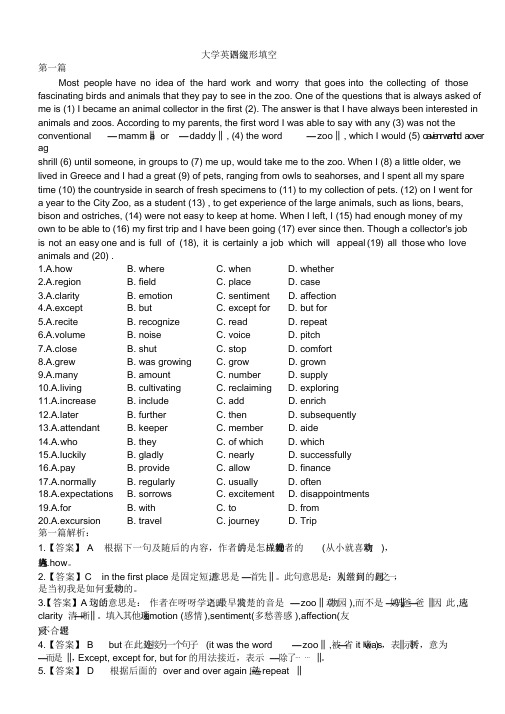
大学英语完形填空四级第一篇Most people have no idea of the hard work and worry that goes into the collecting of those fascinating birds and animals that they pay to see in the zoo. One of the questions that is always asked of me is (1) I became an animal collector in the first (2). The answer is that I have always been interested in animals and zoos. According to my parents, the first word I was able to say with any (3) was not the conventional ―mamm‖a or ―daddy‖, (4) the word ―zoo‖, which I would (5) o a v i e n r w a n i t h d aover agshrill (6) until someone, in groups to (7) me up, would take me to the zoo. When I (8) a little older, we lived in Greece and I had a great (9) of pets, ranging from owls to seahorses, and I spent all my spare time (10) the countryside in search of fresh specimens to (11) to my collection of pets. (12) on I went fora year to the City Zoo, as a student (13) , to get experience of the large animals, such as lions, bears, bison and ostriches, (14) were not easy to keep at home. When I left, I (15) had enough money of my own to be able to (16) my first trip and I have been going (17) ever since then. Though a collector's jobis not an easy one and is full of (18), it is certainly a job which will appeal (19) all those who love animals and (20) .1.A.how B. where C. when D. whether2.A.region B. field C. place D. case3.A.clarity B. emotion C. sentiment D. affection4.A.except B. but C. except for D. but for5.A.recite B. recognize C. read D. repeat6.A.volume B. noise C. voice D. pitch7.A.close B. shut C. stop D. comfort8.A.grew B. was growing C. grow D. grown9.A.many B. amount C. number D. supply10.A.living B. cultivating C. reclaiming D. exploring11.A.increase B. include C. add D. enrichter B. further C. then D. subsequently13.A.attendant B. keeper C. member D. aide14.A.who B. they C. of which D. which15.A.luckily B. gladly C. nearly D. successfully16.A.pay B. provide C. allow D. finance17.A.normally B. regularly C. usually D. often18.A.expectations B. sorrows C. excitement D. disappointments19.A.for B. with C. to D. from20.A.excursion B. travel C. journey D. Trip第一篇解析:1.【答案】A 根据下一句及随后的内容,作者讲的是怎样成为动物爱好者的(从小就喜欢动物),择A.how。
2023年英语专业四级真题完形填空及答案解析

英语专业四级真题完形填空及答案解析PART III CLOZE[15 MIN]Decide which of the choices given below would best complete the passage if inserted in the corresponding blanks. Mark the best choice for each blank on Answer Sheet Two.How men first learned to invent words is unknown; (31) , the origin of language is a mystery. All we really know is that men, unlike animals, somehow invented certain (32) to express thoughts and feelings, actions and things, (33) they could communicate with each other; and that later they agreed (34) certain signs, called letters, which could be (35) to represent those sounds, and which could be (36) . Those sounds, whether spoken, (37) written in letters, we call words.The power of words, then, lies in their (38) the things they bring up before our minds. Words become (39) with meaning for us by experience; (40) the longer we live, the more certain words (41) to us the happy and sad events of our past; and the more we (42) , the more the number of words that mean something to us (43) .Great writers are those who not only have great thoughts but also express these thoughts in words which appeal (44) to our minds and emotions. This (45) and telling use of words is what we call (46) style. Above all, the real poet is a master of (47) . He can convey his meaning in words which sing like music, and which (48) their position and association can (49) men to tears. We should, therefore, learn to choose our words carefully and use them accurately, or theywill (50) our speech or writing silly and vulgar.31、A. in addition B. in other words C. in a word D. in summary32、A. sounds B. gestures C. signs D. movements33、A. such that B. as that C. so that D. in that34、A. in B. withC. ofD. upon35、A. spelt B. combinedC. writtenD. copied36、A. written down B. handed downC. rememberedD. observed37、A. and B. yetC. alsoD. or38、A. functions B. associationsC. rolesD. links39、A. filled B. fullC. liveD. active40、A. but B. orC. yetD. and41、A. reappear B. recallC. rememberD. recollect42、A. read and think B. read and recallC. read and learnD. read and recite43、A. raises B. increasesC. improvesD. emerges44、A. intensively B. extensivelyC. broadlyD. powerfully45、A. charming B. academicC. conventionalD. common46、A. written B. spokenC. literaryD. dramatic47、A. signs B. wordsC. styleD. sound48、A. in B. onC. overD. by49、A. move B. engageC. makeD. force50、A. transform B. changeC. makeD. convertPART Ⅲ CLOZE答案解析31、B 32、A33、C[解析] 根据句意,人会发出某种特定旳声音来表达对应旳思想感情、行为动作和其他事情,目旳是为了交流,应选C项so that。
英语四级完形填空及答案解析
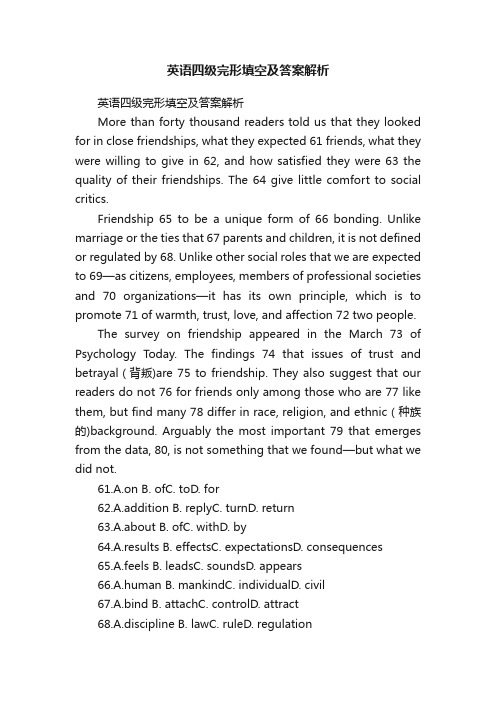
英语四级完形填空及答案解析英语四级完形填空及答案解析More than forty thousand readers told us that they looked for in close friendships, what they expected 61 friends, what they were willing to give in 62, and how satisfied they were 63 the quality of their friendships. The 64 give little comfort to social critics.Friendship 65 to be a unique form of 66 bonding. Unlike marriage or the ties that 67 parents and children, it is not defined or regulated by 68. Unlike other social roles that we are expected to 69—as citizens, employees, members of professional societies and 70 organizations—it has its own principle, which is to promote 71 of warmth, trust, love, and affection 72 two people.The survey on friendship appeared in the March 73 of Psychology Today. The findings 74 that issues of trust and betrayal(背叛)are 75 to friendship. They also suggest that our readers do not 76 for friends only among those who are 77 like them, but find many 78 differ in race, religion, and ethnic(种族的)background. Arguably the most important 79 that emerges from the data, 80, is not something that we found—but what we did not.61.A.on B. ofC. toD. for62.A.addition B. replyC. turnD. return63.A.about B. ofC. withD. by64.A.results B. effectsC. expectationsD. consequences65.A.feels B. leadsC. soundsD. appears66.A.human B. mankindC. individualD. civil67.A.bind B. attachC. controlD. attract68.A.discipline B. lawC. ruleD. regulation69.A.keep B. doC. showD. play70.A.all B. anyC. otherD. those71.A.friendship B. interestsC. feelingsD. impressions72.A.between B. onC. inD. for73.A.print B. issueC. publicationD. copy74.A.secure B. assureC. confirmD. resolve75.A.neutral B. mainC. nuclearD. central76.A.ask B. callC. appealD. look77.A.most B. moreC. leastD. less78.A.people B. whoC. whatD. friends79.A.conclusion B. summaryC. decisionD. claim80.A.moreover B. howeverC. stillD. yet【答案】:61.B62.D63.C64.C65.D66.C67.A68.B69.D70.C71.C72.A73.B74.C75.D76.D77.A78.B79.A80.B【答案解析】:61.B此题考查介词用法。
大学英语四级完形填空(附答案解析良心制作)
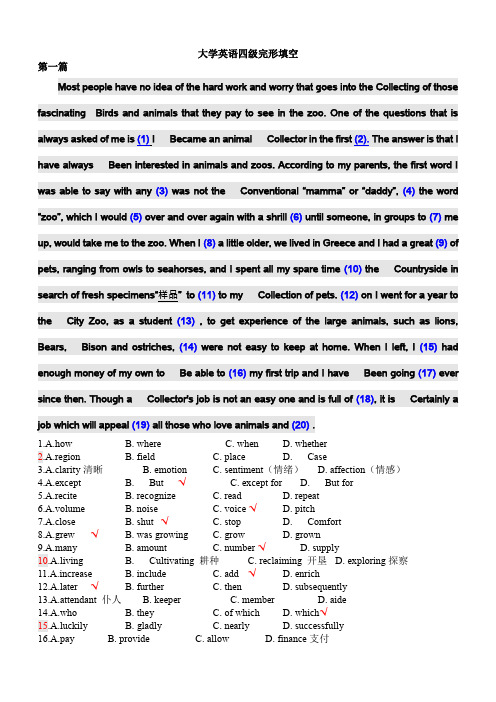
大学英语四级完形填空第一篇Most people have no idea of the hard work and worry that goes into the Collecting of those fascinating Birds and animals that they pay to see in the zoo. One of the questions that ishave always Been interested in animals and zoos. According to my parents, the first word I was able to say with any (3)was not the Conventional “mamma” or “daddy”, (4) the word “zoo”, which I would (5) over and over again with a shrill (6) until someone, in groups to (7) me up, would take me to the zoo. When I (8) a little older, we lived in Greece and I had a great (9) of pets, ranging from owls to seahorses, and I spent all my spare time (10) the Countryside inthe City Zoo, as a student(13) , to get experience of the large animals, such as lions, Bears, Bison and ostriches, (14) were not easy to keep at home. When I left, I (15)had enough money of my own to Be able to (16) my first trip and I have Been going (17) ever since then. Though a Collector's job is not an easy one and is full of (18), it is Certainly a job which will appeal (19) all those who love animals and (20) .1.A.how B. where C. when D. whether2.A.region B. field C. place D. Case3.A.clarity清晰 B. emotion C. sentiment(情绪) D. affection(情感)4.A.except B. But √ C. except for D. But for5.A.recite B. recognize C. read D. repeat6.A.volume B. noise C. voice √ D. pitch7.A.close B. shut √ C. stop D. Comfort8.A.grew √ B. was growing C. grow D. grown9.A.many B. amount C. number √ D. supply10.A.living B. Cultivating 耕种 C. reclaiming 开垦 D. exploring探察11.A.increase B. include C. add √ D. enrichter √ B. further C. then D. subsequently13.A.attendant 仆人 B. keeper C. member D. aide14.A.who B. they C. of which D. which√15.A.luckily B. gladly C. nearly D. successfully16.A.pay B. provide C. allow D. finance支付17.A.normally B. regularly C. usually D. often18.A.expectations B. sorrows C. excitement D. Disappointments√19.A.for B. with C. to√ D. from20.A.excursion B. travel √ C. journey D. Trip第一篇解析:1.【答案】A 根据下一句及随后的内容,作者讲的是怎样成为动物爱好者的(从小就喜欢动物),应当选择A.how。
大学英语四级完形填空(附答案解析良心制作)

第一篇Most people have no idea of the hard work and worry that goes into the Collecti ng ofthose fasc in at ing Birds and ani mals that they pay to see in the zoo. One of the questi ons thatis always asked of me is (1) I Became an an imal Collector in the first (2). The an swer isthat I have always Bee n in terested in ani mals and zoos. Accord ing to my pare nts, the first word I was able to say with any (3) was not the Conven ti onal “ mamm” or “ daddy ”eword “ zoo” , which I wou(5) over and over aga in with a shrill (6) un til some one, in groups to (7) me up, would take me to the zoo. When I (8) a little older, we lived in Greece and I had a great(9) of pets, ranging from owls to seahorses, and I spent all my spare time (10) the Countryside in search of fresh specimens 样品” to (11) to my Collection of pets. (12) on I went for a year to the City Zoo, as a student (13) , to get experienee of the large animals,such as lio ns, Bears, Bis on and ostriches, (14) were not easy to keep at home. Whe n I left,Be able to (16) my first trip and I have Been going (17) ever since then. Though a Collector's job is not an easy one and is full of (18), it is大学英语四级完形填空1.A.how B. where C. whe n D. whether2.A.region B. field C. place D. Case3.A.clarity 清晰 B. emoti on C. sen timent(情绪) D. affection (情感)4.A.except B. But V C. except for D. But for5.A.recite B. recog nize C. read D. r epeat6.A.volume B. no ise C. voice V D. p itch7.A.close B. shut V C. stop D. Comfort8.A.grew V B. was grow ing C. grow D. g row n9.A.ma ny B. amount C. nu mber V D. supply10.A. livi ng B. Cultivat ing 耕种 C. reclaiming 开垦D. exploring 探察11.A.i ncrease B. in clude C. add V D. e n rich12. ter V B. further C. the n D. subseque ntly13. A.atte ndant 仆人B. keeper C. member D. aide14.A.who B. they C. of which D. which VCertai nly a job which will appeal (19) all those who love an imals and (20).I (15) had eno ugh money of my own toC. usuallyD. often C. exciteme nt D. Disappoi ntme nts V C. to V D. from C. journey D. Trip 1. 【答案】A 根据下一句及随后的内容,作者讲的是怎样成为动物爱好者的 (从小就喜欢动物), 应当选择A.how 。
大学英语四级完形填空包括答案解析良心制作

大学英语四级完形填空 ( 附答案分析良知制作 )大学英语四级完形填空第一篇Most people have no idea of the hard work and worry that goes into the Collecting of those fascinating Birds and animals that they pay to see in the zoo.One of the questions that is always asked of me is(1) I Became an animal Collector in the first(2).The answer is that I have always Been interested in animals and zoos. According to my parents, the first word I was able to say with any(3)was not the Conventional“ mamma”or“ daddy”,(4) the word“ zoo ”, which I would(5)over and over again with a shrill(6) until someone, in groups to(7) me up, would take me to the zoo. When I(8) a little older, we lived in Greece and Ihad a great(9) of pets, ranging from owls to seahorses, and I spent all my spare time(10)the Countryside in search of fresh specimens“样品” to(11)to my Collection of pets.(12) on I went for a year to the City Zoo, as a student(13), to get experience of the large animals, such as lions,Bears,Bison and ostriches, (14) were not easy to keep at home. When I left, I(15) had enough money of myown to Be able to(16)my first trip and I have Been going(17)ever since then. Though a Collector's job is not an easy one and is full of(18) , it is Certainly a job which will appeal(19) all those who love animals and(20) .B. whereC. whenD. whetherB. fieldC. placeD.Case清楚 B. emotion C. sentiment (情绪) D. affection (感情)B.But√C. except forD.But forB. recognizeC. readD. repeatB. noiseC. voice √D. pitchB. shut√C. stopfort√ B. was growing C. grow D. grownB. amountC. number √D. supplyB.Cultivating耕作C. reclaiming开垦D. exploring探察B. includeC. add√D. enrich√ B. further C. then D. subsequently佣人 B. keeper C. member D. aideB. theyC. of whichD. which √B. gladlyC. nearlyD. successfullyB. provideC. allowD. finance 支付B. regularlyC. usuallyD. oftenB. sorrowsC. excitementD.Disappointments √B. withC. to √D. fromB. travel√C. journeyD. Trip第一篇分析:1.【答案】 A依据下一句及随后的内容,作者的是怎成物好者的(从小就喜物当 A.how 。
- 1、下载文档前请自行甄别文档内容的完整性,平台不提供额外的编辑、内容补充、找答案等附加服务。
- 2、"仅部分预览"的文档,不可在线预览部分如存在完整性等问题,可反馈申请退款(可完整预览的文档不适用该条件!)。
- 3、如文档侵犯您的权益,请联系客服反馈,我们会尽快为您处理(人工客服工作时间:9:00-18:30)。
四级英语完形填空练习题及答案解析Who won the World Cup 1994 football game? What happened at the United Nations? How did the critics like the new play? 1 an event takes place; newspapers are on the streets 2 the details. Wherever anything happens in the world, reports are on the spot to 3 the news.Newspapers have one basic 4 , to get the news as quickly as possible from its source, from those who make it to those who want to 5 it. Radio, telegraph, television, and 6 inventions brought petition for newspapers. So did the development of magazines and other means of munication.7 , this petition merely spurred the newspapers on. They quickly made use of the newer and faster means of munication to improve the 8 and thus the efficiency oftheir own operations. Today more newspapers are 9 and read than ever before. Competition also led newspapers to branch out to many other fields. Besides keeping readers 10 of the latest news, today's newspapers 11 and influence readers about politics and other important and serious matters. Newspapers influence readers' economic choices 12 advertising. Most newspapers depend on advertising fortheir very 13 .Newspapers are sold at a price that 14 even a small fraction of the cost of production. The main 15 of ine for most newspapers is mercial advertising. The 16 in selling advertising depends on a newspaper's value toadvertisers. This 17 in terms of circulation. How many people read the newspaper? Circulation depends 18 on the work of the circulation department and on the services or entertainment 19 in a newspaper's pages. But for the most part, circulation depends on a newspaper's value to readers as a source of information 20 the munity, city, country, state, nation, and world—and even outer space.1.A.Just when B.While C.Soon after D.Before2.A.to give B.giving C.given D.being given3.A.gather B.spread C.carry D.bring4.A.reason B.cause C.problem D.purpose5.A.make B.publish C.know D.write6.A.another B.other C.one another D.the other7.A.However B.And C.Therefore D.So8.A.value B.ratio C.rate D.speed9.A.spread B.passed C.printed D.pletedrm B.be informed C.to be informed rmed11.A.entertain B.encourage Ccate D.edit12.A.on B.through C.with D.of13.A.forms B.existence C.contents D.purpose14.A.tries to cover B.manages to cover C.fails to coverD.sueeds in15.A.source B.origin C.course D.finance16.A.way B.means C.chance D.suess17.A.measures B.measured C.Is measured D.was measured18.A.somewhat B.little C.much D.something19.A.offering B.offered C.which offered D.to be offered20.A.by B.with C.at D.about第三篇答案+讲解:1.【答案】A【解析】just在此为副词,意为“刚刚”,做状语。
此句意为“一个事件刚刚发生,街上就有报纸报道详情了。
说明报纸对新闻的反响之快。
2.【答案】A【解析】to give和giving都符合语法,但giving强调的是正在发生的动作,而此处重点表达的是“反响快”,不是正在做。
3.【答案】A【解析】消息,信息要靠收集。
4.【答案】D【解析】后面的不定式短语表示目的。
5.【答案】C【解析】提供信息的目的是为了让他人知道,所以选C。
6.【答案】B【解析】other意为“的”。
此句意为:无线电,电报,电视,及其它创造,成为报纸的竞争对手。
7.【答案】A【解析】根据句中的merely及其考(试大后所述内容,应选however,表转折。
8.【答案】D【解析】使用更新,更快的通讯工具,目的是提高速度。
9.【答案】C【解析】报纸是印出来的,先印后看(读)。
10.【答案】D【解析】keep sb.+过去分词是一种复合构造,sb.与过去分词为被动关系,意为保持这种关系的继续。
此句的意思是:报纸不断地为读者提供新闻信息。
11.【答案】C【解析】politics之类的严肃,只能选educate。
12.【答案】B【解析】此句意为:报纸通过广告影响读者在经济中的选择。
13.【答案】B【解析】大多数报纸依靠广告收入来维持生存,此现象人人皆知。
14.【答案】C【解析】报纸的售价之低,缺乏以抵付本钱的一小局部。
符合上下文关于广告收入的说法。
15.【答案】A【解析】收入应该用source。
因为source指河流,泉水的发源地;常指抽象事物的根源或以及资料,信息的出处或。
origin起源,起因。
指事物后来发生,开展变化的最初起点,或指人的出身和血统。
16.【答案】D【解析】sueed in为固定短语。
此句意为:广告业务的成功,取决于报纸在客户(要打广告的人)心中的价值。
17.【答案】C【解析】根据上下文,此处应该用一般现在时的被动语态,此句意为:报纸考(试大在客户心中的价值,是靠发行量衡量的。
18.【答案】C【解析】该句意为:发行量的大小,很大程度上取决于发行部门的工作及报纸所提供的效劳功能和娱乐功能。
19.【答案】B【解析】offered作services和entertainment的定语。
20.【答案】D【解析】information后面接介词about,表示“关于”。
I have always found country life most 1.The city ,a place 2 business is only to 3;it is not an an ideal place for permanent residence.People may say that the city can provide you with the best 4 life can offer.Your friends are always 5 for an informal chat or an evening’s en tertainment.The 6 exhinitions,films or plays are always within easy reach.Shopping ,too,is always a pleasure.But what 7 the hustle and bustle of city like? The city dweller never has a moment 8peace;he is always9.And what about the noise and pollution of the city? Day and night the city is in uproar with its unceasing traffic.The air is polluted 10 prisonous gases emitted by the smokestacks of factories.The water supply is tained with impurities that are harmful to the human body.The city is indeed not a place to live in.Country life is in many respects superior 11 citylife.For one thing , the people there are friendly.People are acquainted with one 12.You can never 13 receive a friendly nod or a kind word from anyone you 14 meet.In the city people who live in the same 15 are often strangers to one another.The air in the country is fresh and pure.Air pollution is a thing 16 of there.You live a healthy life in the open air.Life goes on in a 17 way and you don’t have to hurry to catch 18 bus or travel in a crowed bus with people 19 like sardines.Gardening and fishing will be pleasant pasttimes.Reading a book 20 the warm fireside will be another pleasant pastime on a cold winter night.Life in the country is indeed simple and pleasant.1) A enjoyable B exciting C experienced D unpleasant2) A in B on C out of D for3) A be visiting B be visited C visit D visited4) A where B when C what D who5) A wanted B wanting C available D enjoyable6) A latest B kindest C richest D poorest7) A of B about C if D should8) A for B even C once D often9) A in a moment B at the moment C in a hurry D in a line10) A in B with C of D within11) A than B to C over D for12) A another B other C what else D the others13) A expected to B want to C fail to D plan to14) A long to B be glad to C want to D chance to15) A apartment B school C room D city16) A hearing B unhearing C heard D unheard17) A leisurely B easily C conveniently D effectively18) A a B the C / D no19) A fighting B fighted C packing D packed20) A behind B by C in D onKEYS:adb abacb bacda daadbMany students find the experience of attending universitylectures to be a confusing and frustrating experience.Thelecturer speaks for one or two hours, perhaps 1 the talk withslides, writing up important information on the blackboard, 2reading material and giving out 3 .The new student sees theother students continuously writing on notebooks and 4 what to write.Very often the student leaves the lecture 5notes which do not catch the main points and 6 beehard even for the 7 to understand.Most institutions provide courses which 8 new students to develop the skills they need to be9 listeners and note-takers. 10 these are unavailable, there are many useful study-skillsguides which 11 learners to practice theseskills 12 .In all cases it is important to 13 theproblem 14 actually starting your studies.It is important to 15 that most students havedifficulty in acquiring the language skills 16in college study.One way of 17 these difficulties is to attend the language and study-skillsclasses which most institutions provide throughout the 18 year.Another basic 19 is to find astudy partner 20 it is possible to identify difficulties, exchange ideas and provide support.1.A.extending B.illustrating C.performing D.conducting2.A.attributing B.contributing C.distributingD.explaining3.A.assignments rmation C.content D.definition4.A.suspects B.understands C.wonders D.convinces5.A.without B.with C.on D.except6.A.what B.those C.as D.which7.A.teachers B.classmates C.partners D.students8.A.prevent B.require C.assist D.forbid9.A.effective B.passive C.relative D.expressive10.A.Because B.Though C.Whether D.If11.A.enable B.stimulate C.advocate D.prevent12.A.independently B.repeatedly C.logically D.generally13.A.evaluate B.acquaint C.tackle D.formulate14.A.before B.after C.while D.for15.A.predict B.acknowledge C.argue D.ignore16.A.to require B.required C.requiring D.are required17.A.preventing B.withstanding C.sustaining D.overing18.A.average B.ordinary C.normal D.academic19.A.statement B.strategy C.situation D.suggestion20.A.in that B.for which C.with whom D.such as1.【答案】B【解析】将第1,2,3题通盘考虑。
